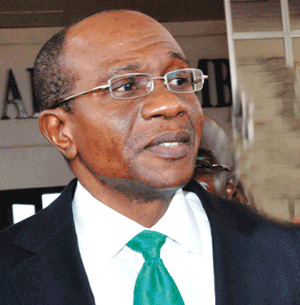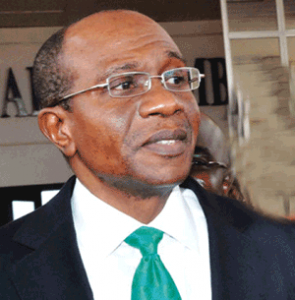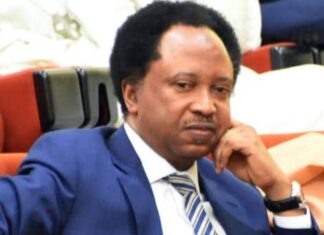There is no better way to address concerns than to boost faith in a resilient economy, against the backdrop of grave economic indices made worse by the fall in crude oil prices, depreciating naira value, and depleting external reserves.
That was what the Central Bank of Nigeria (CBN) did last week at a meeting with investors and the business community organised by the Nigerian Economic Summit Group in Lagos.
CBN Governor, Godwin Emefiele, assured the gathering that there is no need to panic despite negative economic outlook.
The naira has slumped 16 per cent against the dollar on the interbank market in the past six months. Increasing dollar demand by fleeing investors and others continues to exert pressure on the naira, which traded about N189.05 to the dollar on Thursday, January 29.
With foreign reserves dropping as low as $34 billion, enough for only four months import guaranty, the probability of government’s default in meeting financial obligations is high.
Dollar illiquidity has also weakened the outlook of Nigeria’s perception by investors.
Scary economic indicators
Between June 30 and December 31, 2014, the price of Bonny Light crashed by 50.7 per cent, from $112.78 per barrel (pb) to $55.57. It recorded 15 per cent decline between December 31, 2014 and January 23, 2015, falling from $55.57 to $42.22.
Foreign reserves dropped 12.3 per cent from $39.07 billion as of July 2014 to $34.26 billion on January 22, 2015. The major reason is that the CBN defends the naira with dollars withdrawn from the reserves.
Despite its commitment to defending the local currency, its exchange rate to the dollar has continued to depreciate. In 2014, naira value to the dollar fell 8 per cent at the official market but 13 per cent at the interbank markets.
Since January 23, 2015, the naira has depreciated 5.6 per at the interbank market.
The capital market is not spared. It has lost about N2 trillion since the beginning of this year, after losing N2.27 trillion at the close of transactions in December 2014.
The Nigerian Stock Exchange (NSE) All Share Index (ASI), which measures performance of stocks, depreciated by -14.47 per cent on Thursday, January 29, 2015 as investors continue to sell off their shares at giveaway prices to recover whatever is left of their investments.
Emefiele’s threat against economic saboteurs
Emefiele blamed naira woes on foreign exchange (forex) speculators, some of them banks. “The CBN will not hesitate to suspend dealership licenses of banks fueling speculative demand and involved in forex malpractices as well as infractions,” he warned.
He also warned companies implicated in the sharp practices under the guise of seeking dollars to import items.
He pledged that the CBN will never leave the naira at the mercy of market forces of demand and supply of dollar, because the impact would be too grievous for an import dependent economy like Nigeria’s.
He vowed to continue naira defence against the dollar, warning that those speculating on the dollar will lose out.
His words: “The demand pressure needs to stop. Let me tell you that people engaging in speculative activities will lose money. There is no need to import beyond your capacity. Do your business in an orderly manner.
“The $34 billion in the external reserves can support this economy. There is no need to panic or worry. The CBN has shown readiness to support the exchange rate.”
Emefiele said even if external reserves drop to $10 billion, the economy will pull through the challenges.
“It is not unusual that external reserves dwindle as crude oil prices decline, which may lead to depreciation.
“But one major lesson from history is that when foreign reserves declined to $10 billion dollars in the past, the country survived it. So, at the current level of $34 billion, the reserves can support Nigerian economy.
“There is no need to panic or worry. The Bank will continue to monitor developments and respond appropriately as the need arises. We will continue to support the naira to stabilise the exchange rate, and make sure that speculators lose their money.”
He noted that though decline in crude oil prices continues to put demand pressure on the domestic economy due to over dependence on imports – causing speculative and rent seeking activities as well as increased foreign exchange out flows – the CBN will find a solution in conjunction with other stakeholders.
He called on all stakeholders to join hands with the CBN to address the threats and unfolding risks posed by oil price slump, saying successful management of the current situation requires effective collaboration.
Frivolous imports to stop
Emefiele listed the measures undertaken by CBN to address the challenges to include the review of banks’ foreign currency net open position, weekly forex sales to bureau de change (BDC) operators, and increased scrutiny of items to be imported with forex purchased from the banks.
The ultimate way to end speculative demand for the naira is for Nigeria to produce what it imports, he added.
The CBN plans to stop the sale of forex to importers of rice and other frivolous commodities.
“The more we import, the more we deplete our reserves. As times goes on, we will not allocate forex to companies importing rice.
“We import virtually everything into this country. We import toothpicks, toothpastes, petroleum products and all manner of things. Should we be importing everything?”
Emefiele pledged, however, that the CBN will meet legitimate demands for forex.
Dangote Group Chairman, Aliko Dangote, reiterated at the conference that Nigeria does not need to import everything, and advised the business community to seek to export commodities.
“We need to set a foundation for the country’s revenue base. We need to become an exporting country after which we can then allow the naira to float without supporting it,” Dangote counselled.
He disclosed that his companies have invested in several projects that would make them become the highest forex seller by 2018.
Former Diamond Bank Chairman, Pascal Dozie, said the current challenges in the economy present the best time for wise investors, but advised Abuja to restructure the economy and urged the CBN to encourage fiscal authorities to diversify the economy.
“If there is no corresponding action from the fiscal authorities, the CBN will continue to be under pressure,” Dozie added.














